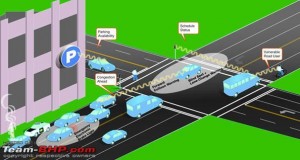A number of auto industry trade groups are unhappy with a proposed bill that hit the U.S. Senate last week, a piece of legislation that many say could compromise the future of vehicle-to-vehicle (V2V) communication.
The bill, introduced last week by Sens. Marco Rubio (R–FL) and Cory Booker (D–NJ), is called the WiFi Innovation Act. The act would open up to the public 5.9 gigahertz of Internet access that has been set aside for short-range V2V communication since 1999.
Many tech groups support the legislation, including the Consumer Electronics Association, which released a report last week gauging the economic impact of devices that use unlicensed spectrums—like the 5.9 gigahertz up for grabs currently.
“Consumer demand for spectrum-enabled products that provide the ‘anytime/anywhere’ connectivity we want is now driving the need for even more unlicensed spectrum,” the Consumer Electronics Association said in the release. “Through the study initiated by this legislation, the FCC will be empowered to put our country’s spectrum to its most efficient use.”
But those in the auto industry say there’s more at risk than human connectivity, including safety factors from WiFi interference or unavailability, and even stunting innovation in the industry.
“The lifesaving benefits of V2V communications are within reach. Given what’s at stake, an ill-informed decision on this spectrum is a gamble,” said Association of Global Automakers (AGA) President and CEO John Bozzella in a statement last week.
Currently, thousands of vehicles with V2V communication technology are being tested on public roads, according to the AGA, and the Department of Transportation has agreed that the use of the technology could help drivers avoid nearly 4.5 million accidents a year.
In addition, many industry groups are concerned that sharing the 5.9 gigahertz could stunt V2V technology growth before it ever has a chance to get off the ground, according to Associations.

